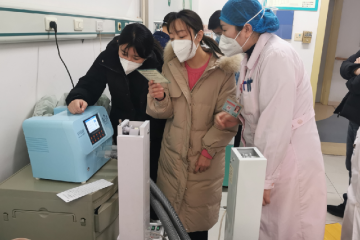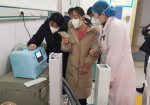The Latest Advances in Lung Cancer Treatment

Elderly asian woman stressed, cry worry sitting on a bed hospital emergency room suffering from pneumonia cough that put her at risk lung cancer was shocked to see blood in her sputum.
Immunotherapy Breakthroughs
Recent years have seen a surge in immunotherapy options for lung cancer patients. These treatments harness the body’s immune system to identify and attack cancer cells. Notable advancements include the development of checkpoint inhibitors, which block proteins that prevent the immune system from attacking cancer cells, and the emergence of personalized cancer vaccines.
Targeted Therapy Developments
Targeted therapies have revolutionized the treatment landscape for lung cancer. These drugs specifically target genetic mutations or proteins that contribute to cancer growth. The introduction of new tyrosine kinase inhibitors and the expansion of molecular testing have allowed for more precise treatments, leading to improved patient outcomes.
Advancements in Gene Therapy
Gene therapy represents a cutting-edge approach to treating lung cancer. By introducing, removing, or altering genetic material within a patient’s cells, researchers aim to fight cancer at its source. Ongoing research is focused on viral vector-based therapies and gene editing techniques like CRISPR to target cancer cells more effectively.
Novel Chemotherapy Agents
Chemotherapy remains a cornerstone of lung cancer treatment, but new agents are being developed to increase efficacy and reduce side effects. These novel compounds are designed to be more selective, targeting cancer cells while sparing healthy tissue. Enhanced drug delivery systems, such as nanoparticle-based chemotherapy, are also under investigation to improve treatment outcomes.
Personalized Medicine and Lung Cancer
The landscape of lung cancer treatment is undergoing a significant transformation with the advent of personalized medicine. This approach tailors treatment to the individual characteristics of each patient’s cancer, leading to more effective and less toxic therapies.
Genomic Profiling in Treatment Planning
Genomic profiling has become a cornerstone in the fight against lung cancer. By analyzing the tumor’s genetic makeup, oncologists can identify specific mutations and select therapies that directly target those alterations. This precision not only improves outcomes but also spares patients from the side effects of ineffective treatments.
- Identification of actionable mutations
- Selection of targeted therapies
- Potential for improved patient outcomes
Biomarker-Driven Therapies
The use of biomarkers to guide therapy choices is another critical aspect of personalized medicine. Biomarkers can predict which patients are likely to benefit from certain drugs, thus optimizing treatment efficacy and minimizing unnecessary exposure to potentially harmful side effects.
- Predictive biomarker testing
- Tailored drug selection
- Enhanced treatment efficacy
Customized Treatment Strategies
Customized treatment strategies involve a comprehensive approach that considers the patient’s genetic profile, disease stage, and overall health. This may include a combination of surgery, radiation, chemotherapy, and novel agents, all chosen based on the patient’s unique cancer characteristics.
- Integration of multiple treatment modalities
- Consideration of patient-specific factors
- Holistic approach to lung cancer care
The integration of personalized medicine into lung cancer care promises to revolutionize the prognosis and quality of life for patients, making treatment more targeted and effective than ever before.
Technological Innovations in Lung Cancer Care
The landscape of lung cancer care is rapidly evolving with the integration of cutting-edge technologies that aim to improve surgical outcomes, enhance diagnostic accuracy, and provide continuous patient care. These innovations are not only revolutionizing treatment approaches but also offering new avenues for patient monitoring and support.
Robotic Surgery Enhancements
Robotic surgery has become a pivotal component in the treatment of lung cancer, offering greater precision and reduced recovery times. The latest advancements include:
- Enhanced 3D visualization for surgeons
- Greater dexterity with robotic instruments
- Minimally invasive procedures resulting in less postoperative pain
These improvements have led to more precise tumor removals and have significantly lowered the risk of complications, thereby improving patient outcomes.
AI in Lung Cancer Diagnosis and Prognosis
Artificial Intelligence (AI) is transforming the field of oncology by providing tools that can analyze complex medical data with unprecedented speed and accuracy. In lung cancer care, AI applications include:
- Analyzing imaging scans to detect tumors at earlier stages
- Predicting patient outcomes based on historical data
- Assisting in the development of personalized treatment plans
AI’s ability to learn and adapt continues to provide invaluable insights that can lead to more effective and individualized care for lung cancer patients.
Telemedicine and Remote Monitoring
The adoption of telemedicine and remote monitoring systems has been accelerated by the need for continuous care amidst global health challenges. These technologies enable:
- Remote consultations, reducing the need for hospital visits
- Continuous monitoring of patient vitals and symptoms
- Immediate adjustments to treatment plans as needed
By leveraging these tools, healthcare providers can offer uninterrupted care, ensuring that patients receive timely interventions and support, regardless of their location.
Combination Therapies and Clinical Trials
Synergistic Effects of Combined Treatments
The landscape of lung cancer treatment is witnessing a paradigm shift with the advent of combination therapies. These treatments leverage the synergistic effects of two or more drugs to enhance efficacy and potentially reduce side effects. For instance, combining immunotherapy with chemotherapy or targeted therapy has shown promising results in increasing survival rates.
Ongoing and Upcoming Clinical Trials
Clinical trials are the backbone of medical advancements, and lung cancer is no exception. Researchers are continuously exploring new combinations of treatments, with numerous trials currently underway. Patients and healthcare providers can stay informed about these trials through various medical databases and clinical trial registries.
Patient Selection for Combination Therapies
Selecting the right patients for combination therapies is crucial for maximizing benefits and minimizing risks. Factors such as genetic markers, disease stage, and previous treatment responses are considered. It’s important for patients to discuss the potential risks and benefits of combination therapies with their healthcare team to make informed decisions.
Supportive Care and Quality of Life Improvements
The landscape of lung cancer treatment extends beyond the direct attack on cancer cells. Supportive care and enhancing the quality of life for patients have become integral components of comprehensive cancer care. These aspects focus on alleviating symptoms, managing treatment side effects, and providing emotional and psychological support to patients and their families.
Palliative Care Advancements
Recent advancements in palliative care have significantly improved the management of symptoms and side effects associated with lung cancer and its treatment. Key developments include:
- Enhanced pain management techniques that provide more effective relief with fewer side effects.
- Integrative therapies, such as acupuncture and massage, which complement traditional treatments to help manage symptoms.
- Improved communication between healthcare providers and patients, ensuring that patient preferences and goals of care are prioritized.
Managing Side Effects and Symptoms
The management of side effects and symptoms is crucial for maintaining the quality of life during lung cancer treatment. Efforts to improve this include:
- The use of antiemetic drugs to better control nausea and vomiting.
- Nutritional support to address weight loss and malnutrition.
- Strategies to minimize the impact of fatigue, one of the most common and debilitating side effects of cancer treatment.
Psychosocial Support for Patients and Families
Recognizing the emotional and psychological toll of lung cancer, there is a growing emphasis on providing comprehensive psychosocial support:
- Counseling services and support groups offer a space for emotional expression and shared experiences.
- Programs designed to help patients and families cope with the stress and anxiety that come with a cancer diagnosis.
- Resources that assist with the practical aspects of living with cancer, such as financial planning and navigating healthcare systems.
- By addressing these critical areas, healthcare providers aim to not only extend life but also improve the lived experience of those battling lung cancer.















